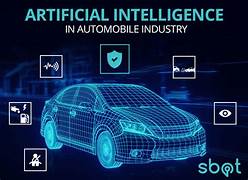How Is AI Technology Changing the Automotive Industry?
Artificial Intelligence (AI) is driving transformative change across industries, and the automotive sector is no exception. From autonomous vehicles to predictive maintenance, AI is redefining how cars are designed, manufactured, and operated. The integration of AI into automotive systems is enhancing safety, improving efficiency, and delivering personalized user experiences. This article explores the ways AI is revolutionizing the automotive industry, the benefits it offers, and the challenges it poses.
AI Applications in the Automotive Industry
1. Autonomous Vehicles
Perhaps the most visible application of AI in the automotive industry is in autonomous vehicles, also known as self-driving cars. These vehicles rely on AI algorithms, sensors, cameras, and radar systems to navigate roads, avoid obstacles, and make real-time decisions.
- Advanced Driver-Assistance Systems (ADAS): ADAS features, such as lane-keeping assistance, adaptive cruise control, and automatic emergency braking, use AI to enhance driver safety.
- Levels of Autonomy: Fully autonomous vehicles, like those being developed by Tesla, Waymo, and others, aim to operate without human intervention, relying on AI to interpret traffic laws, weather conditions, and road hazards.
2. Predictive Maintenance
AI-powered systems can predict potential vehicle issues before they become serious problems. By analyzing data from sensors embedded in the vehicle, AI can identify patterns indicating wear and tear, such as abnormal vibrations or engine anomalies. This predictive maintenance capability:
- Reduces vehicle downtime.
- Lowers maintenance costs.
- Enhances vehicle lifespan.
3. Manufacturing and Supply Chain Optimization
AI is streamlining automotive manufacturing and supply chain processes by:
- Quality Control: AI-powered vision systems can detect defects in components during production, ensuring higher quality standards.
- Process Optimization: AI algorithms analyze production line data to identify inefficiencies and recommend improvements.
- Inventory Management: Predictive analytics powered by AI helps manufacturers optimize inventory levels and reduce waste.
4. Personalized In-Car Experiences
AI is transforming the driving experience by enabling personalized features:
- Voice Assistants: AI-powered voice assistants like Amazon Alexa or Google Assistant are integrated into cars to provide hands-free control of navigation, music, and more.
- Infotainment Systems: AI tailors content recommendations based on driver preferences and habits.
- Adaptive Settings: Vehicles equipped with AI can adjust seat positions, climate control, and even driving modes based on individual driver profiles.
5. AI in Electric Vehicles (EVs)
AI is playing a crucial role in the development and operation of electric vehicles. Key contributions include:
- Battery Management: AI optimizes battery performance and longevity by monitoring charging patterns and usage data.
- Route Optimization: AI helps EV drivers find the most efficient routes, considering factors like battery range and the availability of charging stations.
- Energy Efficiency: AI enhances energy usage within the vehicle by optimizing systems such as heating, ventilation, and air conditioning (HVAC).
6. Enhanced Safety Features
AI-powered safety features are making roads safer for drivers, passengers, and pedestrians:
- Collision Avoidance: AI systems analyze data from sensors to detect potential collisions and take preventive action.
- Driver Monitoring Systems: AI monitors driver behavior to identify signs of fatigue, distraction, or impairment, issuing alerts or taking corrective measures.
- Pedestrian Detection: AI algorithms enhance pedestrian detection capabilities, even in low-light or adverse weather conditions.
Benefits of AI in the Automotive Industry
1. Increased Safety
AI-driven technologies significantly reduce human error, which is a leading cause of road accidents. Autonomous features, predictive maintenance, and driver monitoring systems contribute to safer driving experiences.
2. Cost Savings
By optimizing manufacturing processes, reducing maintenance costs, and improving fuel efficiency, AI helps automakers and consumers save money.
3. Enhanced Customer Experience
AI enables automakers to deliver personalized and intuitive user experiences. From adaptive infotainment systems to predictive services, customers benefit from smarter and more responsive vehicles.
4. Environmental Impact
AI contributes to sustainability by improving the efficiency of electric vehicles and reducing emissions through optimized driving patterns and better fuel management.
5. Operational Efficiency
AI enhances the efficiency of automotive production lines and supply chains, reducing waste and accelerating the delivery of vehicles.
Challenges and Risks of AI in the Automotive Industry
1. High Development Costs
The research and development required for AI technologies are expensive. This cost is passed on to consumers, making advanced vehicles less affordable for some markets.
2. Regulatory Hurdles
Autonomous vehicles face stringent regulatory requirements to ensure safety and reliability. Achieving compliance can be time-consuming and costly.
3. Data Privacy Concerns
AI systems collect vast amounts of data from vehicles and drivers. Ensuring data security and addressing privacy concerns are critical challenges.
4. Reliability and Accountability
Determining liability in accidents involving AI-powered vehicles is a complex issue. Automakers, insurers, and policymakers must collaborate to establish clear guidelines.
5. Job Displacement
The automation of manufacturing processes and the rise of autonomous vehicles may lead to job losses in certain sectors of the automotive industry.
Future Trends in AI and Automotive
1. Full Autonomy
The development of fully autonomous vehicles is progressing rapidly. As technology advances, these vehicles will become more reliable, affordable, and widely adopted.
2. AI-Driven Smart Cities
AI-powered vehicles will play a crucial role in the development of smart cities, integrating with traffic management systems to reduce congestion and improve urban mobility.
3. Vehicle-to-Everything (V2X) Communication
AI will enhance V2X communication, enabling vehicles to interact with each other, infrastructure, and pedestrians to create safer and more efficient transportation systems.
4. Sustainability Focus
AI will continue to drive innovations in electric vehicles and other sustainable transportation solutions, reducing the environmental footprint of the automotive industry.
5. Augmented Reality (AR) Integration
AI and AR will converge to provide drivers with real-time information, such as navigation assistance, hazard alerts, and vehicle diagnostics, through head-up displays and smart glasses.
Conclusion
AI is revolutionizing the automotive industry, driving advancements in autonomous vehicles, predictive maintenance, manufacturing efficiency, and personalized user experiences. While challenges such as high costs, regulatory hurdles, and data privacy concerns remain, the potential benefits of AI far outweigh these obstacles.
As technology continues to evolve, AI’s role in the automotive sector will only expand, paving the way for safer, more efficient, and sustainable transportation solutions. The collaboration between automakers, AI developers, and policymakers will be crucial in shaping a future where AI-powered vehicles redefine mobility and transform the driving experience.


